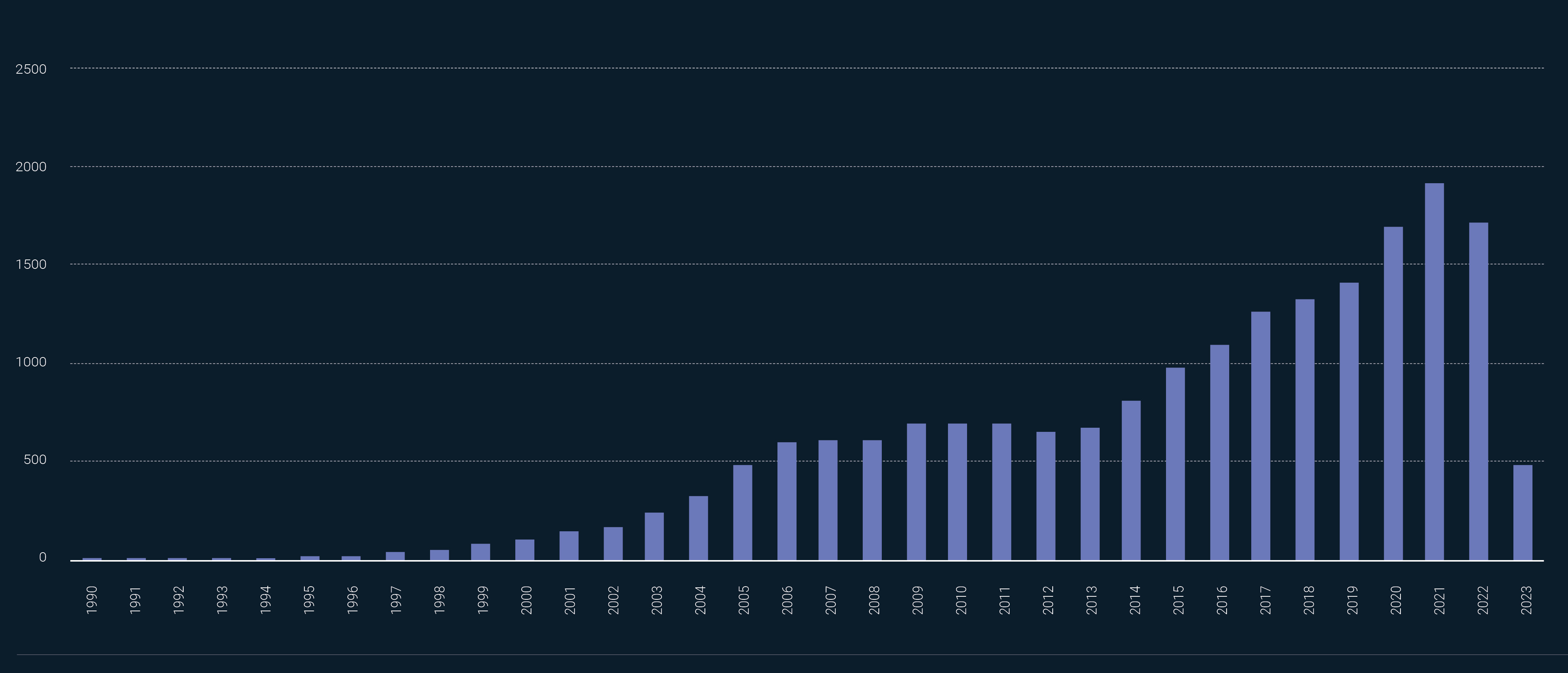Cancer is a major and growing cause of disease and death. A 2022 study estimated that, globally, in 2019, there were almost 24 million new cancer cases and 10 million cancer deaths.1
New treatments that use the power of the body’s own immune system – immuno-oncology – are transforming the treatment landscape and brightening the long-term outlook for diagnosis and patientcare.
Focusing on one of medicine’s largest unmet needs, these innovative therapies represent some of the fastest-growing areas of scientific investigation and product development. We created the Immuno-Oncology index to provide exposure to companies associated with these pioneering solutions.
Developed in collaboration with Royalty Pharma, the index aims to represent the performance of a set of companies contributing to or benefitting from the advancing science and utilisation of immuno-oncology therapeutics.
What is immuno-oncology?
Immuno-oncology (IO) is the therapeutic strategy of harnessing a patient’s immune system to recognise and attack cancer cells that uses pharmaceutical products or biologics.2
This is achieved by stimulating a patient’s immune system, or with the administration of modified products with oncolytic properties.3
Sizing the immuno-oncology market
Immuno-oncology, or cancer immunotherapy, is one of the fastest-growing areas of scientific investigation and product development. It is now a major presence in treatment protocols of many types of cancer, even though the first drug approval only occurred in 2011.4
Today, there are 23 IO products being marketed in seven major markets with prophylactic and therapeutic cancer vaccines leading the category with nine products, followed by “checkpoint modulators” and cell therapies.5/6
As of February 2023, there are nearly 3,000 active or planned, industry-sponsored clinical trials investigating immuno-oncology therapies spanning over 700 industry sponsors studying over 1,000 investigational drugs in clinical development.
What are the different immuno-oncology treatments?
Cancer vaccines: to teach the immune system how to recognise tumours.
Checkpoint inhibitors (CPI): these inhibit the pd-1 molecules expressed on the surface of t-cells and hence reduce the cancer’s immunosuppressive signals.
Immune stimulators: for example, il-2/Proleukin, which is a protein that directly stimulates immune cells, as opposed to a CPI which disrupts native inhibitory signalling, see below.
Bispecific antibodies: for example, t-cell “engagers” that target immune cells to the tumour by linking between different antigens on the surface of each.
Immune cell therapies: for example, infusions of CAR T-cells (“chimeric antigen receptor” T-cells i.e., genetically engineered T-cell receptors) and NKs (enhanced and modified “natural killer” cells) to attack the tumour directly, alongside other approaches that seek to make the tumour more recognisable by the immune system or help the immune system to better recognise a tumour.
Chart 1: Key events in the immune-oncology timeline. From Coley’s early discoveries to recent approvals for melanoma and lung cancer.

Why use an index to gain exposure?
Unlike traditional investment approaches that may focus on ‘past winners’, thematic investing aims to capture a future world that may differ greatly from the past. Our thematic indices seek to capture these future-forward themes directly using a rules-based methodology. Our research team has leveraged the insights of well-known industry experts and combined them with our data and index construction experience to help investors gain exposure to the opportunities these long-term trends may hold.
MSCI has identified four key categories to classify the megatrends that many believe represent the dynamic forces shaping our future. Health and healthcare, transformative technologies, environment and resources and society and lifestyle.
Within health and healthcare, we have focused on identifying companies linked to innovations in novel life science therapies and diagnosis, digital healthcare and genomics. The MSCI ACWI Investable Market Immuno-oncology index aims to represent the performance of a set of companies that are associated with the research, development and commercialisation of products for cancer immunotherapy, also known as immuno-oncology.
Chart 2: Commercial company-sponsored clinical trial trends. Sharp increase in number of IO clinical trials in the last decade.

Conclusion
Despite advances that have revolutionised cancer care, oncology remains one area with the largest unmet need in medicine. The field of immuno-oncology is at the frontline of treatments for most major types of cancer. The number of clinical trials testing IO therapies grew more than tenfold in the 1990s, tripled in the 2000s and doubled again in the 2010s. The pace of IO clinical trial starts has accelerated: from 2014 to 2021, annual clinical trial starts increased at a 18.5% CAGR.
Challenges clearly remain related to treatment complexity and control, cost and patient safety, however, these are seeing rapid progress and high levels of research activity and trials. Bringing together our data and insight with Royalty Pharma’s industry expertise, our new index can help investors exploit these disruptive trends in the biopharmaceutical and life sciences industry.
We invite you to learn more about our thematic investing research, indexes and tools at msci.com/thematic-investing
This article was first published in Thematics Unlocked: Looking Under The Bonnet, an ETF Stream report. To read the full report, click here.
1 J. M. Kocarnik et al, (2022) “Cancer Incidence, Mortality, Years of Life Lost, Years Lived With Disability, and Disability-Adjusted Life Years for 29 Cancer Groups From 2010 to 2019: A Systematic Analysis for the Global Burden of Disease Study 2019” JAMA Oncology, 8(3), p.420–444. 2 A “biologic” is a biological substance (such as proteins, including antibodies) created synthetically or naturally from a living organism or their products, that may be used as a diagnostic or in the prevention or treatment of a disease. 3 Oncolytic refers to the destruction of a tumour or cancerous cells. 4 Yervoy (ipilimumab) 5 US, Japan, Germany, UK, France, Spain, Italy 6 Checkpoint modulators’ role is to prevent an immune response from being so strong that it destroys healthy cells in the body. Source: https://www.cancer.gov/aboutcancer/treatment/types/immunotherapy/checkpoint-inhibitors
Important information
MSCI would like to thank Royalty Pharma for useful discussions and insightful analysis of this megatrend that facilitated the preparation of this material. Royalty Pharma is the largest buyer of biopharmaceutical royalties and a leading funder of innovation across the biopharmaceutical industry. Since its founding in 1996, Royalty Pharma has been a pioneer in the royalty market, collaborating with innovators from academic institutions, research hospitals and not-for-profits through small and mid-cap biotechnology companies to leading global pharmaceutical companies. The company is uniquely positioned to provide expert oversight and input across a broad array of healthcare themes by identifying and tracking developments in the sector at scale.
ABOUT MSCI
MSCI is a leading provider of critical decision support tools and services for the global investment community. With over 50 years of expertise in research, data and technology, we power better investment decisions by enabling clients to understand and analyse key drivers of risk and return and confidently build more effective portfolios. We create industry-leading research-enhanced solutions that clients use to gain insight into and improve transparency across the investment process. The information contained herein (the “Information”) may not be reproduced or redisseminated in whole or in part without prior written permission from MSCI. The Information may not be used to verify or correct other data, to create any derivative works, to create indexes, risk models, or analytics, or in connection with issuing, offering, sponsoring, managing or marketing any securities, portfolios, financial products or other investment vehicles. Historical data and analysis should not be taken as an indication or guarantee of any future performance, analysis, forecast or prediction. None of the information or MSCI index or other product or service constitutes an offer to buy or sell, or a promotion or recommendation of, any security, financial instrument or product or trading strategy. Further, none of the Information or any MSCI index is intended to constitute investment advice or a recommendation to make (or refrain from making) any kind of investment decision and may not be relied on as such. MSCI ESG and climate ratings, research and data are produced by MSCI ESG Research LLC, a subsidiary of MSCI Inc. MSCI ESG Indexes, Analytics and Real Estate are products of MSCI Inc. that utilise information from MSCI ESG Research LLC. MSCI Indexes are administered by MSCI Limited (UK). The Information is provided “as is” and the user of the Information assumes the entire risk of any use it may make or permit to be made of the Information. NONE OF MSCI INC. OR ANY OF ITS SUBSIDIARIES OR ITS OR THEIR DIRECT OR INDIRECT SUPPLIERS OR ANY THIRD PARTY INVOLVED IN MAKING OR COMPILING THE INFORMATION (EACH, AN “INFORMATION PROVIDER”) MAKES ANY WARRANTIES OR REPRESENTATIONS AND, TO THE MAXIMUM EXTENT PERMITTED BY LAW, EACH INFORMATION PROVIDER HEREBY EXPRESSLY DISCLAIMS ALL IMPLIEDWARRANTIES, INCLUDING WARRANTIES OF MERCHANTABILITY AND FITNESS FOR A PARTICULAR PURPOSE. WITHOUT LIMITING ANY OF THE FOREGOING AND TO THE MAXIMUM EXTENT PERMITTED BY LAW, IN NO EVENT SHALL ANY OF THE INFORMATION PROVIDERS HAVE ANY LIABILITY REGARDING ANY OF THE INFORMATION FOR ANY DIRECT, INDIRECT, SPECIAL, PUNITIVE, CONSEQUENTIAL (INCLUDING LOST PROFITS) OR ANY OTHER DAMAGES EVEN IF NOTIFIED OF THE POSSIBILITY OF SUCH DAMAGES. The foregoing shall not exclude or limit any liability that may not by applicable law be excluded or limited. Privacy notice: For information about how MSCI collects and uses personal data, please refer to our Privacy Notice at https://www.msci.com/privacy-pledge.



